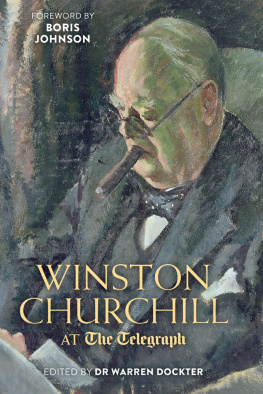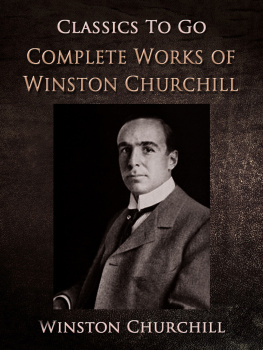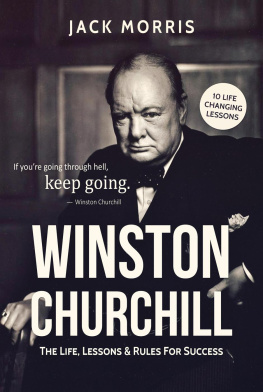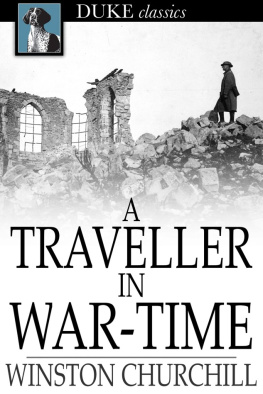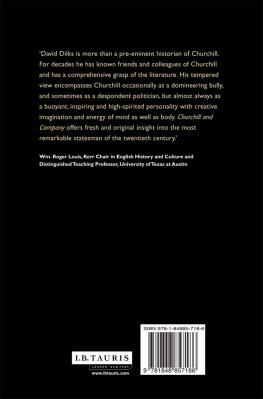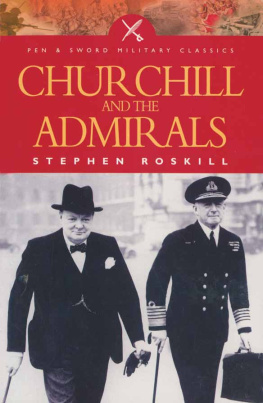Winston Churchill at



First published in Great Britain
2015 by Aurum Press Ltd
7477 White Lion Street
Islington
London N1 9PF
www.aurumpress.co.uk
Copyright 2015 Telegraph Media Group Limited
Foreword 2015 Boris Johnson
Dr Warren Dockter has asserted his moral right to be identified as the Editor of this Work in accordance with the Copyright Designs and Patents Act 1988.
All rights reserved. No part of this book may be reproduced or utilised in any form or by any means, electronic or mechanical, including photocopying, recording or by any information storage and retrieval system, without permission in writing from Aurum Press Ltd.
Articles by Winston S. Churchill, reproduced with permission of Curtis Brown, London on behalf of the Beneficiaries of the Estate of Winston S. Churchill. Copyright The Beneficiaries of the Estate of Winston S. Churchill.
Every effort has been made to trace the copyright holders of material quoted in this book. If application is made in writing to the publisher, any omissions will be included in future editions.
A catalogue record for this book is available from the British Library.
ISBN 978 1 78131 452 4
eBook ISBN 978 1 78131 469 2
1 3 5 7 9 10 8 6 4 2
2015 2017 2019 2018 2016
eBook conversion by CPI Group (UK) Ltd, Croydon, CR0 4YY
CONTENTS
When the Daily Telegraph celebrated its 100th birthday in 1955, the newspaper received a message of congratulation from Winston Churchill pointing out that he was the oldest and longest serving member of the papers staff. He was quite right.
It was a relationship that had begun in 1897, when he went off with Sir Bindon Blood to serve and observe the forces of the British Empire. He sent back several gut-wrenching accounts of the fighting, vividly describing the frenzy of the Pashtun tribesmen in what is now the badlands of Pakistan, and the awful carnage wreaked by the British machine-guns. His byline was a young officer, and he was paid 5 per piece.
He was initially disappointed not to be properly credited with the articles but enough people knew the truth (thanks partly to his mother; she probably slept with the extravagantly moustachioed Bindon Blood to get her boy the job), and his reputation started to grow. So did his relationship with the great Conservative paper.
It was the Daily Telegraph that had the immeasurable moral distinction, in the 1930s, of sticking with Churchill and publishing his views on Germany even when they were unfashionable, and when other London newspapers were either refusing his copy (the Evening Standard springs to mind) or actively promoting appeasement of Hitler (the Daily Mail). It was the Telegraph that published his denunciations of Nazism right up until the outbreak of war, and it was Viscount Camrose of the Daily Telegraph who was indispensable to the solution of Churchills financial problems, setting up the trust that enabled him to continue to live at his beloved Chartwell.
Winston Churchill owed a huge amount to the Telegraph and the world owes an incalculable debt to that journalistic relationship. Why did Winston Churchill see so clearly the peril of Nazi Germany? Why was he almost alone, for so long, in his warnings?
It was at least partly because he had actually been out to Germany, in the early 1930s. He had seen the spooky marches of the blond-headed young men and women, the black and red swastika bunting in the streets. Indeed, he tried (though thankfully failed) to secure an interview with Hitler. It was the same instinct that took him to Cuba, to Malakand, to the Sudan, to the Boer War and to the trenches the same urge that made him try to join the fleet at D-Day.
It wasnt just a quest for military glory; it was a lust to see for himself, to clarify his thoughts by his own observation, and to articulate what was going on with his own extraordinary gifts of expression. He was, in other words, a superb reporter; and it was Churchill the reporter who enabled Churchill the statesman to get it right about Hitler.
The Daily Telegraph can claim a significant and honourable role in helping to launch that career, and in supporting him at an absolutely critical juncture. It was a symbiosis that should come as no surprise, when you consider that Churchill and the Telegraph shared much in their political character romantic, imperialist, fervently pro-British, but basically soft-hearted and with a sympathy for the underdog.
Boris Johnson
This year marks the fiftieth anniversary of the passing of one of the most iconic and major figures of the twentieth century, Sir Winston Churchill. His legacy looms large in the British national psyche and commands reverence from all quarters of the globe. He is best remembered as the man who saved Britain, if not the whole world, from the Nazi war machine during the Second World War. His awe-inspiring oratory gave the British lion its roar and his speeches have been immortalised in the annals of history.
Winston Churchill was born when the British Empire was arguably at its zenith, in 1874, and left power for the last time in 1955, when the inevitable break-up of the British Empire was under way. He was prime minister in the Second World War and helped steer Britain through the early phases of the Cold War. But more than that, he was a soldier, a journalist, a novelist, an historian and a politician. During his career, Churchill, like Britain, had to come to grips with the forces of modernity. This often led to him holding complex and, at times, paradoxical views. For instance, he was an affirmed believer in Empire but loathed the punitive butcher and bolt campaigns which were employed on the frontiers of the British Empire. He believed in free markets (so much so that he left the Tories in 1904 when they began to experiment with imperial protectionism), but he also championed social reforms (along with Lloyd George) that helped lay the foundation for the welfare state. He was at once principled and a political opportunist; a progressive Victorian but a reactionary modern statesman. In short, Winston Churchills legacy is wedded to Britains.
His political legacy is remarkable. He invented the concept of the summit, where leaders of the highest rank would meet and solve problems, he forged an alliance with the United States and he championed international organisations like the League of Nations and later the UN. His parliamentary career spanned sixty-four years. Not including his own premierships, Churchill served under thirteen prime ministers, represented five different constituencies and was a member of two major parties throughout his long life in British politics. Though Churchills political legacy undoubtedly resonates more with the right than the left, political ideologies compete to share in his achievements. The right celebrate Churchills devotion to Britain, free trade and tradition, while the left venerate his championing of social reform during the early 1900s and his inclusive approach to the formation of his wartime government.
Beyond Churchills considerable life in politics, it is often forgotten that he was also a journalist of note, much like his father Lord Randolph Churchill. Churchill developed a knack for writing very early on. In 1895, he went to observe the Cuban War of Independence and was commissioned by the Daily Graphic to report on what he had seen. It was a profound trip for Churchill. While he was there he came under fire for the first time and he learned to love the excitement of battle. He also developed a taste for Cuban cigars which would stay with him all his life and become a part of his iconic appearance.
Next page
